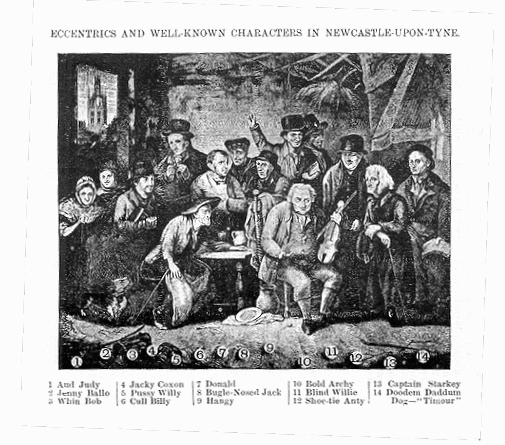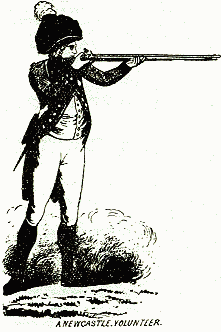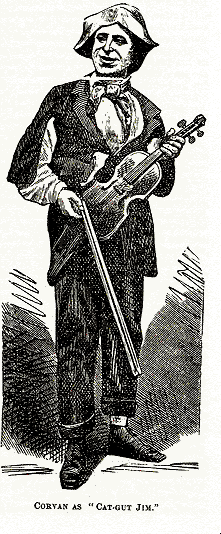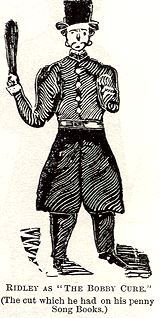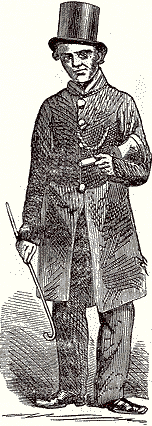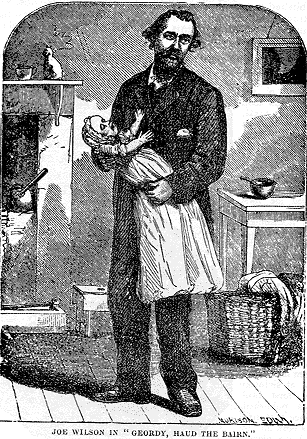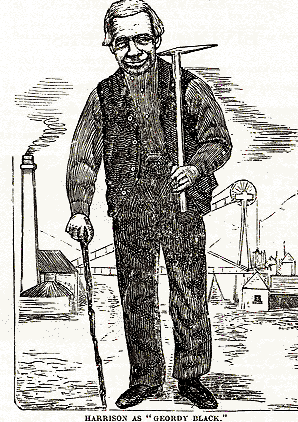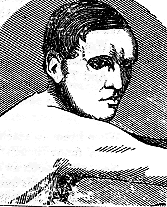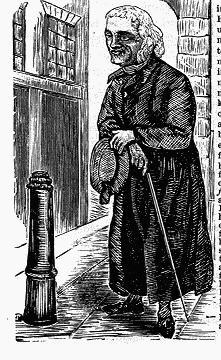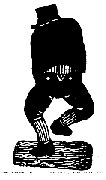Blind Willie
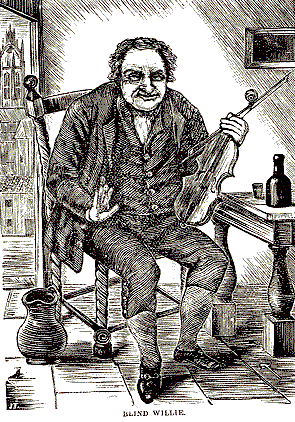 |
From Allan:
WILLIAM PURVIS (BLIND WILLIE). "
Blind Wyllie, ancient laureate of the Tyne."
So in jest Thomas Thompson happily hits off the "minstrel,"
poor blind Willie, who, hatless in all weathers, for
BLIND WILLIE.
has an interesting account of him ; from it principally we
take the following : — "
William Purvis, son of John Purvis, a waterman, was
born in Newcastle, and baptised at All Saints' Church,
February i6th, 1752. Blind from his birth, his drifting to
music gave him his living, such as it was. Although depending
on the charity of the public, street performances were
rare with him, his more general custom being to attend some
favourite public-house, where he never failed to attract a
company to listen to his riddling and singing the old Newcastle
ditties, '
Which helped away wi' mony a gill '
Mang fuddling men and queerish women.' " "
Buy Broom Busoms" was his favourite song. The
melody is said to have been Willie's own composition, but
of that Mr. Stokoe says there is no evidence except his
partiality for it. The following is the song as it appears in
Bell's Northern Bards: —
BROOM BUSOMS.
If you want a busom
For to sweep your house,
Come to me, my lasses,
Ye ma ha' your choose.
Buy broom busoms,
Buy them when they're new,
Buy broom busoms,
Better never grew.
If I had a horse,
I would have a cart ;
If I had a wife,
She wad take my part.
Buy broom busoms, etc.
Had I but a wife,
I care not who she be ;
If she be a woman,
That's enough for me.
Buy broom busoms, etc.
If she lik'd a drop,
Her and I'd agree ;
If she did not like it,
To the foregoing Blind Willie (the native minstrel of
Newcastle) has added the following simple rhymes :—
Up the Butcher Bank,
And down Byker Chare ;
There you'll see the lasses
Selling brown ware.
Buy broom busoms, etc.
Alang the Quayside,
Stop at Russell's Entry ;
There you'll see the beer drawer,
She is standing sentry.
Buy broom busoms, etc.
If you want an oyster,
For to taste your mouth,
Call at Handy Walker's—
He's a bonny youth.
Buy broom busoms, etc.
Call at Mr. Loggie's,
He does sell good wine ;
There you'll see the beer drawer,
She is very fine.
Buy broom busoms, etc.
If you want an orange
Ripe and full of juice,
Gan to Hannah Black's ;
There you'll get your choose.
Buy broom busoms, etc.
Call at Mr. Turner's,
At the Queen's Head ;
He'll not set you away
Without a piece of bread.
Buy broom busoms, etc.
Down the river side
As far as Dent's Hole ;
There you'll see the cuckolds
Working at the coal.
Buy broom busoms, etc.
Bell's "Northern Ballad*."
Willie had his regular houses of call, where he was always
welcome, and duly served. Thus he used to drop in on his
rounds at Messrs. Clapham & Gilpin's chemist's shop,
first in Silver Street, and afterwards in Pilgrim Street, for
the purpose of getting a dole of Spanish juice, which was
never denied him. His invariable address was, "Hinny,
doctor, gie us a bit o' Spanish ! " uttered in the confident
tones of a simple, guileless boy ; and " God blish the king —
God blish the King ; never shaed him — never sheed him ;
poor shoul — poor shoul!" was his regular form of thanksgiving.
Willie's mother, Margaret Purvis, who died in All
Saints' poor-house, had reached her hundredth year ; and
Willie, who breathed his last in the same place on the 2oth
July 1832, was in his eighty-first year.
An interesting description of Blind Willie is given in the
Monthly Chronicle, vol. ii. The writer was in a public
house when Blind Willie came in. "With the instinct
peculiar to blind people Willie made his way instantly to
us. We rose at once, and handed him a chair. Willie's
dress was generally grey, and he wore buckles, like our
keelmen of old. He always went without a hat, and groped
his way about wonderfully. "
As soon as Willie got seated, he said, 'Bonny beer,
bonny beer.' We took the hint, and at once ordered a pint
of beer to be brought to him. Willie went on, ' God blish
the king — God blish the king ; never sheed him — never
sheed him ; poor shoul — poor shoul!' " '
Willie,' we said, after he had taken a good draught of
the beer — 'Willie, we once heard you sing a little song.
Will you kindly repeat it ? ' " '
Shartinly, shartinly, ma chewel.' "
Billy puts down the fiddle, and accompanies a sort of
chorus by clapping his knees with both his hands : — "
For to make the haggish nishe
They put in some brown spishe.
Tarum tickle, tan dum,
To the tune o' tan dum,
Tarum tickle, tan dum. "
And to make the haggish fine
They put in a bottle of wine.
Tarum tickle, tan dum,
To the tune o' tan dum,
Tarum tickle, tarum tickle tan dum. " '
Ha, ha, ha, ha, ha,' chuckles Billy when he had finished, '
poor shoul, poor shoul ! ' "
Perhaps there is none of Newcastle's eccentrics more
referred to in local song than "Blind Willie." Allusions
to him abound. Gilchrist wrote an epitaph on his death,
a verse from which may fittingly conclude this.
0 wondrous indeed is this bever'ge ethereal !
The mortal who quaffs it, altho' a mere clod,
Is straightway transformed to a being aerial,
And moves on earth's surface in fancy a God.
In a bumper is given
A foretaste of Heaven,
All earthly vexations straight cease to annoy ;
Whilst laughing and crying
And efforts at flying
Bespeak the soul tost in a tempest of joy.
For what can so fire us ? etc.
Haste, haste to partake on't, ye men of grave taces,
Ye Quakers, and Methodist parsons likewise ;
What tho' ye seem lost to the flexible graces,
And dormant the risible faculty lies,
One quaff of the vapour
Will cause you to caper,
And swiftly relax your stiff solemnis'd jaws ;
You'll acknowledge the change too,
As pleasing as strange too,
And make the air ring with loud ha ! ha ! ha ! ha's !
For what can so fire us ? etc.
Let gin, rum, and brandy grow dearer and dearer,
Distillers stop working — no toper will mourn ;
Of Gas we can make a delectable cheerer,
Which nor reddens our noses, nor livers will burn ;
Unbeholden to whisky
We'll drink and get frisky,
Nor fear that to-morrow our temples may ache ;
Neither stomach commotions,
Nor camomile potions,
Shall evermore cause us with terror to quake.
For what can so fire us ? etc.
Let the miser's deep coffers be fill'd to his mind now,
Let the man of ambition with honours abound ;
Give the lover his mistress, complying and kind too,
And with laurel let Poets and Heroes be crown'd.
Let all be blest round me,
No envy shall wound me,
Contented and cheerful thro' life will I pass,
If fortune befriends me,
And constantly send me
A quantum sufficit of Oxygen Gas.
For what can so fire us ? etc.
Was always hatless. Son of John Purvis a waterman born Newcastle
baptised All Saints' Church, Feb 16,1752. Blind from birth. "Drifting
to
music gave him his living..." Rarely performed but rather played in
the
public house. fiddler and singer. Favorite song- Buy Broom Busoms which
it is said he may have composed but this is disputed. Favorite stops-
Messrs Clapham and Gilpin's chemist's ship (Silver St. later Pilgrim
Street).
There he obtained Spanish juice. He would cry- "Hinny, doctor, gie
us a bit o' Spanish!". "God blish the king- God blish the King;
never
sheed him-never sheed him;poor shoul-poor shoul!" was his cry of thanks.
Mother= Margaret Purvis died All Saints' poor-house at age 100. Willie
died there July 20 1832 at age 81.
The Monthly Chronicle, Vol. ii describes him as he entered a public
house:
"Wit the instinct peculiar to blind people Willie made his way instantly
to us.
We rose at once, and handed him a chair. Willie's dress was generally
grey, and
he wore buckles, like our keelmen of old. He always went without
a hat,
and groped his way about wonderfully.
As soon as Willie got seated he said, "Bonny beer, bonny beer."
We took the
hint and at once ordered a pint of beer to be brought to him. Willie
went on " God
blish the king--God blish the king; never sheed him-never sheed
him; poor shoul-
poor shoul!" Willie we said after he had taken a good draught of
the beer-
Willie, we once heard you sing a little song. Will you kindly repeat
it?
"Shartinly, shartinly, ma chewel."
Billy puts down the fiddle and accompanies a sort of chorus by clapping
his knees with both hands--
For to make the haggish nishe
They put in some brown spishe.
Tarum tickle, tan dum,
to the tune o' tan dum,
Tarum tickle, tan dum.
And to make the haggish fine
They put in a bottle of wine.
Tarum tickle, tan dum,
To the tune o' tan dum,
Tarum tickle, tarum tickle tan dum.
Ha, ha, ha, ha,ha, chuckles Billy when he had finished, poor shoul,
poor shoul!"
BLIND WILLIE'S SINGING.
William Purvis was the well-known native minstrel of Newcastle-apon-
Tyne. He was a very harmless character, and if not blind from his birth,
was 90 from a very early period of life. It is a singular fact that he always
spoke as if he possessed the sense of sight, for nothing was more common
than to hear him express an ardent wish to see the king, for poor Billy was
very loyal. When Lord Stowell visited Newcastle, William told him (on
being presented to his lordship) that he was glad to see him (Lord Stowell)
look so well ! Billy could never be prevailed upon to wear a hat. Lord
Stowell gave him one, and desired him to use it. Willie did so for half a
day, and could suffer it no longer, appearing once more with his bare head
exposed to all the transitions of the weather. His memory was very
tenacious; any simple rhymes communicated to him he never forgot.
Any one presenting him with a halfpenny, and telling him their name, might
be assured their name, voice, and bounty would be retained in grateful
remembrance. William was an inhabitant of the poor-house of All Saints,
but wandered much about the town, distinguishing every street, alley,
house, or shop with astonishing exactness. Even when a change of tenants
took place, he soon discovered it, and would, in passing, pronounce the
name of the new occupier. He was universally a favourite, and few passed
him without showing their sympathy and respect for Poor Blind WUKe.
July 30th, 1829. R. G.
TUNE—" Jimmy Joneson's Whurry."
YE gowks that 'bout daft Handel swarm,
Your senses but to harrow —
Styen deaf to strains that myest wad charm
The heart iv a wheelbarrow.
To wor Keeside awhile repair, '
Mang Malls an' bullies pig in,
To hear encor'd, wi' monny a blair,
Poor au'd Blind Willies singin.
To hear fine Sinclair tune his pipes
Is hardly worth a scuddock —
It's blarney fair, and stale as swipes
Kept ower lang i' the huddock.
Byeth Braham an' Horn behint the wa'
Might just as weel be swingin,
For a' thor squeelin's nowt at a'
Aboot " Sir Maffa " lang he sung,
Far into high life keekin,
Till by " Broom buzzoms " roundly swung,
He ga' their lugs a sweepin.
A stave yence myed Dumb Bet to greet,
Se fine wi' cat-gut stringin —
Bold Archy said it was a treat
To hear Blind Willie singin.
Aw've heard it said, Fan Welch, one day,
On pepper' d oysters messin,
Went in to hear him sing an' play,
An' get a moral lesson ;
She vow'd 'twas hard to haud a heel,
An' thowt (the glass whilst flingin)
Wi' clarts they should be plaister'd weel,
That jeer'd Blind Willie's singin.
It's fine to hear wor Bellman talk,
It's wond'rous fine an' cheerin
To hear Bet Watt an' Euphy Scott
Scold, fight, or bawl fresh heerin ;
To see the keels upon the Tyne,
As thick as hops, a' swimmin,
Is fine indeed, but still mair fine
To hear Blind Willie singin.
Lang may wor Tyneside lads se true,
In heart byeth blithe an' mellow,
Bestow the praise that's fairly due
To this bluff, honest fellow —
And when he's hamper'd i' the dust,
Still i' wor memory springin,
The times we've run till like te brust,
But may he live to cheer the bobs,
That skew the coals te shivers,
Whee like the drink te grip their gobs,
And burn their varry livers.
So, if you please, aw'll myek an end,
My sang ne farther dingin,
Lest ye may think that aw pretend
To match Blind Willie's singin.
GILCHEIST. Authoft Edition, 1824.-Allan
Acrostic

On the Death of a celebrated eccentric Character of Newcastle
Upon Tyne
Blithe Minstrel of the banks of Tyne,
Lo! o'er thy bier, for aud langsyne,
In Silent groups, each rolling year,
Northumbira's sons will drop a tear!
Death cut thee down--the tyrant scream'd,
When thy bright spirit o'er him beam'd!
In vengeful moot he view'd his claim,
Lost in the triumph of thy name.--
Let Tyne's fam'd sons proclaim afar--
You shall outlive the morning Star!
William Purvis, more generally known by the name of Blind Willy, died
on Friday the
20th July, 1832
Aged 80 years.
R. Emery-In - In: The Newcastle Song Book or Tyne-Side Songster.,
W&T Fordyce
Newcastle Upon Tyne.
|
